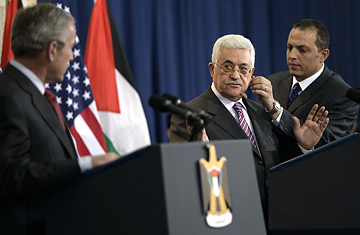
An aide replaces Palestinian President Mahmoud Abbas's faulty translation equipment during a press conference with President George W. Bush in Ramallah, January 10, 2008.
Despite stepping up his personal involvement in the process, the odds of President Bush achieving his goal of a framework agreement between Israel and the Palestinians by year's end may be shrinking. The President hosted Jordan's King Abdullah for breakfast at the White House on Wednesday, and will welcome Palestinian Authority President Mahmoud Abbas for talks on Thursday afternoon. But less than three weeks before he travels to the Middle East himself, Bush's peacemaking efforts have been set back by Israeli Prime Minister Ehud Olmert's decision not to attend an Arab summit in Sharm el-Sheik in mid-May, sources familiar with the planning tell TIME.
Bush will visit Israel on May 14 to celebrate the Jewish State's 60th anniversary, and will later go to Sharm for talks with Abbas and Egypt's President Hosni Mubarak on the sidelines of a long-scheduled economic summit. Mubarak invited Olmert to join them, but, according to a senior Administration source, the Israeli premier declined the invitation. "Olmert made it clear to the Egyptians he does not want to go because he thinks it will just mean pressure on him for concessions," the official says. The Israeli Embassy in Washington declined to comment.
Raising the pressure on both sides to make concessions is, of course, the very purpose of such talks, because while the discussions held since last November's Annapolis summit have covered many sensitive issues, progress toward an agreement has been slow. Israeli Foreign Minister Tzipi Livni recently presented Palestinians with a map outlining Israeli ideas for a border between the two states, sources familiar with the talks tell TIME. And both sides have discussed the difficult issues of refugee return and the division of Jerusalem. But nothing has yet been put on paper, and there have been no actual negotiations. To get traction it would be "useful to have some Arab countries and Israel at the same meeting," and Bush's presence would "give added impetus" to the talks, says Eqyptian ambassador to Washington Nabil Fahmy.
Despite the talk about talks, conditions on the ground are deteriorating. Continuing Israeli settlement activity and roadblocks infuriate the Palestinians, and their Arab neighbors. And attacks out of Gaza by Abbas' Palestinian adversary, the militant group Hamas, undermine Israel's willingness to move ahead on a deal. Egypt has been attempting to negotiate a cease-fire between Israel and Hamas, but talks on that front remain difficult.
A final peace deal between Israelis and Palestinians is not possible without Hamas, however, because it remains a powerful and popular force in the Palestinian territories. That's why some, like former President Jimmy Carter, who met with Hamas leaders last week, are calling for the peace process to include talks with the Islamist group that won the most recent Palestinian election. The U.S., Egypt and Israel, however, believe that reconciling the two Palestinian factions will only be possible after a peace deal is agreed in principle. "We want [Palestinian] reconciliation to be based on a peace process," says Fahmy.
Some diplomats familiar with the discussions say the Israelis may yet show up in Sharm. But the one reliable thing about the peace process is that it can always get worse. Increased Hamas attacks in coming weeks could fuel an Israeli incursion into Gaza just ahead of Bush's trip. Then, no one will want a summit, since it would only deepen the impression that the peace process is completely removed from facts on the ground.
